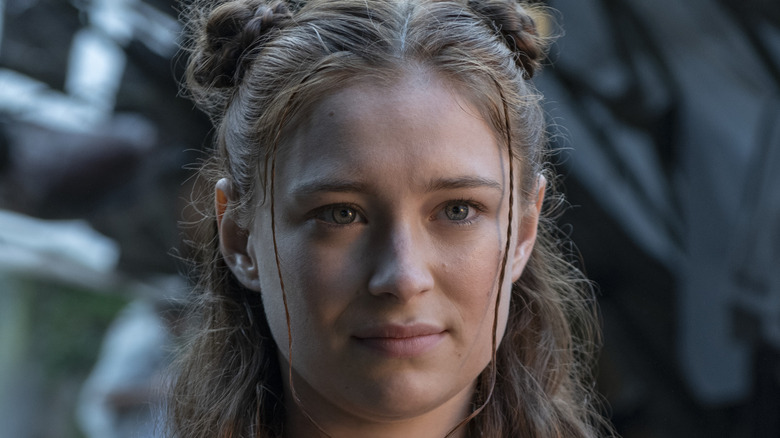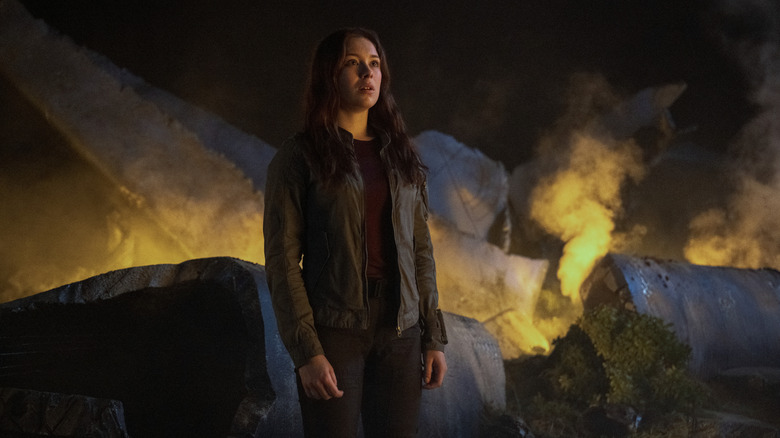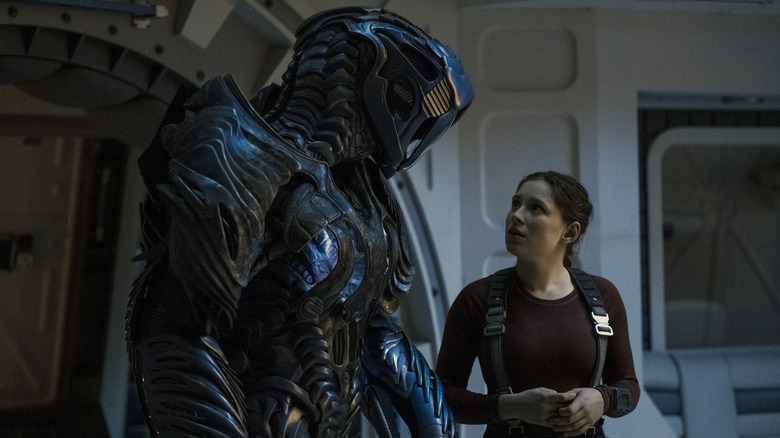What Mina Sundwall Hopes People Take Away From Lost In Space's Ending - Exclusive
Netflix's remake of the classic sci-fi series "Lost in Space" is finished. It's been five years and three seasons since the Robinson family boarded the Jupiter 2 and found themselves trapped on an alien world. After an unexpected pitstop along the way to their new home on Alpha Centauri, their journey is over.
A lot happens to the Robinsons and their crew along the way. Maureen (Molly Parker) and John Robinson (Toby Stephens) have to reckon with a broken marriage in the midst of ongoing chaos. Judy Robinson (Taylor Russell) has to grow up fast enough to become a doctor and a leader. Will Robinson (Maxwell Jenkins) must gain the trust of a robot in order to gain the trust of many more robots. In non-Robinson family news, Don West (Ignacio Serricchio) befriends a chicken, and Dr. Smith (Parker Posey) learns how not to be a malignant narcissist all the time.
There's also Penny Robinson (Mina Sundwall), the child who is neither technologically nor analytically minded. Penny travels a long way, too — she becomes the one to lead the way with empathy and she's the one who ultimately pens the Robinson story so that future generations can learn from their adventures.
Looper sat down with Sundwall to discuss what she sees as the lessons people can take away from "Lost in Space" after three seasons.
How Lost in Space speaks to pandemic isolation
"Lost in Space," like many TV shows and movies coming out in the last two years, has been impacted by the ongoing COVID-19 pandemic The show's third season was filmed while dealing with COVID restrictions, and, in a kind of parallel way, the opening of the final season involves characters being long-term isolated from one another.
"I'm sure that everybody will relate to different parts of the season," says Mina Sundwall when we asked if COVID might impact how people view the show this year. "But from where I was, reading the scripts as they were coming out and relating to the characters, it does feel, especially for the kids, very similar in the sense that they had to mature very quickly. I think that the isolation and being alone mixed with constantly being in the digital world expedited a lot of the maturity and independence of teenagers right now, and that carries through in the context of our show a little bit."
Equality in STEM and providing care
Sundwall also sees intentional lessons meant to be gained from "Lost in Space" in its entirety. "Our show is set 30 years in the future," she says. "There are women in positions that you ... I mean, like a rocket scientist and doctors and in places that would be a conversation right now, but we don't have a female doctor, we just have a doctor, and we don't have a female rocket scientist, we have a rocket scientist. It's not a conversation, and that point has stood out to me a lot because that's where we hope to get to, and beginning to have an attitude towards it where it doesn't need to be a conversation is something that I carry with me a lot ... I think we could use a little bit more of that in the world right now."
However, if there's one major take away from "Lost in Space," Sundwall says it's about providing care wherever you can. "I think the main one of the show is always that no matter what, looking out for the people around you and bringing people into your world is so important," she says. "I'm trying to find the best way to word this, but just to take care of everyone around you, really. I think we could use a little bit more of that in the world right now."
The third and final season of "Lost in Space" is streaming on Netflix now.


